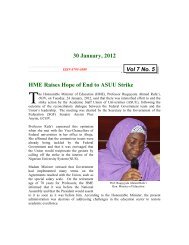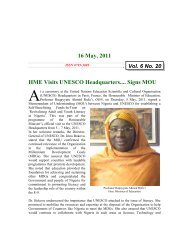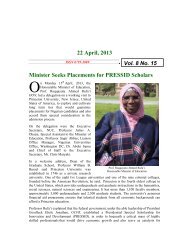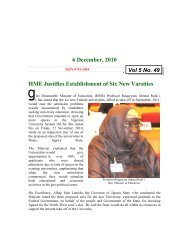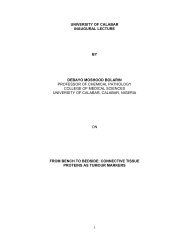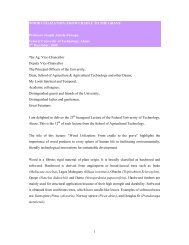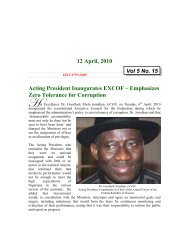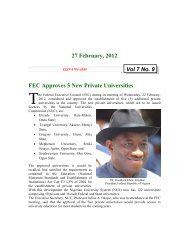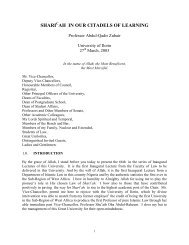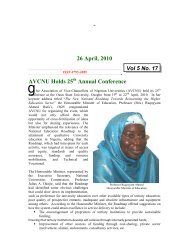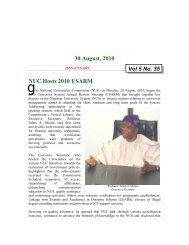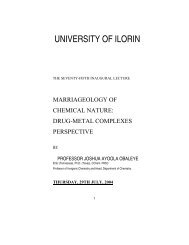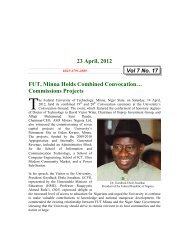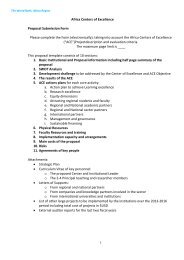From State And State Power To Man And Social - National ...
From State And State Power To Man And Social - National ...
From State And State Power To Man And Social - National ...
Create successful ePaper yourself
Turn your PDF publications into a flip-book with our unique Google optimized e-Paper software.
amparts of peace. It leads statesmen astray, making them to conceive security in terms ofacquisition of more territories, if necessary, by conquest and appropriation of territoriesbelonging to other nations. The realist perspective is a war-prone conception of internationalrelations.In my own view, the raison d’etre of international relations is, and has, in fact, always been theun-ending search for higher standards of living by people inhabiting different parts of the world.Its ultimate goal is neither state power nor raison d’etat: it is not reason of state or statesurvival; it is human welfare. In international relations, human beings are fundamental andelemental. Stripped to the irreducible minimum, the key actors in the international system arehuman beings operating as social groups. The satisfaction of basic human needs is the chiefmotivator of actors in international transactions. The patterns which humans form in that processconstitute the structure of the international system. The laws of motion of the internationalsystem are grounded in the basic contradiction between the uneven occurrence of immobile,scarce materials of social existence, and the mobility of humanity confronting the fixity of thefrontiers of the political organizations into which the world is artificially divided. The challengesthat are posed by this paradox constitute the crux of the international relations problematique.What I have briefly postulated in the above paragraph is another way of looking at internationalrelations which has far-reaching implications for international development and world peace. Itis a novel but controversial perspective. It is the dynamic approach. It is a radical departurefrom the prevailing orthodoxy. It is, therefore, bound to provoke scathing criticisms. I howeverstand by it, because it is the product of thirty-five years of research and reflection on the subjectmatter. A brief reflection on my researches will throw some light on the basis of the newthinking about international relations.The basis of this new thinking may be seen from a review of some of the studies I undertook inthe field of international relations over the years. The first of those studies was, of course, mydoctoral dissertation which was presented to, and accepted by the University of London inAugust, 1977. The thesis was concerned with the constant interpenetration of domestic politicsand foreign policy. Entitled “Domestic Political Structure and Foreign Policy: the NigerianExperience”, it covered a period of fifteen years [1960-1975] of Nigeria’s diplomatic history.The major finding was that, throughout the period under review, Nigeria’s foreign policy wasrooted in domestic concerns and pressures. It was shaped by what the political system could bearand the economy tolerate. The over-riding consideration, especially in the first ten years ofindependence, was the security and stability of the state and government; always coming a closesecond was the desire for economic development. Indeed, from 1970 onwards, it was theeconomy which was given pride of place in the conduct of external relations.I found, too, that the federal cabinet, or council of ministers, played a minimal role in foreignpolicy formulation, often being informed rather than consulted. Policies evolved within severalindividual Ministries, and not just the Federal Ministry of External Affairs; they subsequentlybecame the federal government policies once they received the approval of the relevant Ministerand the Head of Government. The lack of adequate coordination between and among thedifferent Ministries ensured that, in Nigeria, government’s programme was merely a patchwork8



